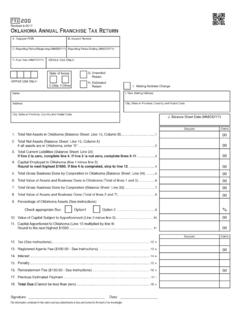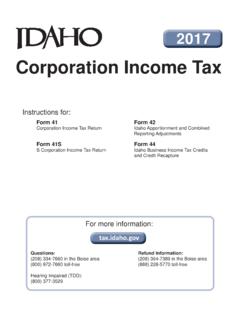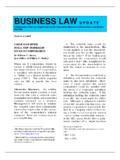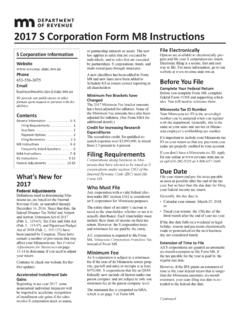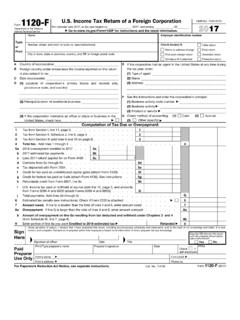Transcription of Buying and Selling a Business Tax Considerations
1 Buying and Selling a Business Tax Considerations Presented by: zLisa LaSaracina, Partner, Tax zAlex Morgan, Partner, Tax 2 Introduction zBuying or Selling a Business is a complex transaction. There are many tax variables to consider, such as: Structure of transaction ( asset sale versus a stock sale) Goals of both Buyer and Seller Types of entities involved as buyer and seller (corporations, partnerships, LLCs, individuals, etc.) Unwanted assets Hidden liabilities 3 Structure of Transaction zAn existing Business can be acquired in two basic ways: The purchaser can buy the Assets of the Business ; or the Stock/Ownership Interests ( the stock of a corporation , a membership interest in an LLC, etc.)
2 4 Critical factors in determining transaction's structure Amount of tax paid by the seller (character & double tax). Assumption of the Business liabilities, including those not yet identified. Purchaser's ability to step up the basis of Business assets (generating a tax benefit when the assets are sold, depreciated, or amortized). Ability to obtain tax related benefits, such as NOL carryovers. Purchaser's ability to amortize intangibles, such as customer lists, contracts, or know-how. 5 What the Seller Wants zSeller's main concerns when a Business is sold are minimizing tax on any realized gain and being insulated from the Business s liabilities 6 What the Seller Wants zIf the Business is a C corporation , the seller often has a strong preference for Selling stock rather than assets because Avoidance of potential double taxation which could occur with asset sale; The seller's gain is almost always capital gain, qualifying for preferential tax rate (currently 20% for 2013).
3 And Liabilities (both known and unknown) associated with the company remain with the stock 7 What the Seller Wants zIf the Business is a partnership, LLC, or S corporation : The negative tax consequences of Selling assets (rather than the entity) are usually less severe, since the gain on asset sale is passed through to the owners resulting in a single layer of tax. Hidden Issues zHot Assets in a partnership zOrdinary Income Assets in an S corporation zState Tax for Nonresident owners What the Buyer Wants zGenerally, buyers prefer to acquire assets rather than stock. zAcquiring assets protects the buyer from assuming the seller's liabilities (especially contingent or unknown liabilities) which is what happens when stock is purchased.
4 ZAn asset purchase also allows the buyer to acquire only the assets it wants. zAn asset purchase allows the purchaser to step up the basis of the acquired assets to FMV. 8 9 Taxable Stock Purchase Seller s Tax Consequences zThe seller realizes capital gain or loss equal to the difference between the sales proceeds and tax basis in the stock. zAssuming the stock was owned for over 12 months, any gain would be taxed at favorable long-term capital gain rates ( 20% under current law.) zAny value assigned to a non compete is taxed as ordinary income 10 Taxable Stock Purchase Buyer s Tax Consequences zBuyer obtains basis equal to its purchase price.
5 ZBasis is not recovered until stock is sold or liquidated. zNo adjustment is made to the basis of the assets in the corporation ( carryover basis). zTax accounting method changes may have negative consequences to buyer 11 Taxable Stock Purchase Buyer s Tax Consequences (cont.) zThe corporation 's tax attributes ( NOL, capital loss, and credit carryforwards) remain with the buyer and are available to offset income generated after the sale. However, IRC Sec. 382 may limit the use of these attributes after an ownership change 12 Taxable Stock Purchase Purchasing Stock with a Sec. 338 Election zWhen a buyer purchases stock, a Sec.
6 338 election treats the purchaser as if assets were purchased for tax purposes. zWhy would a Buyer want a 338 election? The Buyer is purchasing stock but would like a step-up in the basis of the Target s assets. 13 Taxable Asset Purchase zAlthough a purchaser often would prefer to purchase Business assets for reasons discussed earlier ( , limited liability exposure, basis step-up to FMV, ability to purchase only desired assets, and the opportunity to renegotiate or terminate existing unfavorable contracts), the tax cost to the seller is often prohibitive. 14 Taxable Asset Purchase zIn certain situations, however, an asset purchase may be the appropriate structure for a C corporation .
7 ZFor example, if the Selling corporation has NOLs to offset the gain on the asset sale, or the purchaser's step-up will be allocated to assets that are sold or depreciated very quickly (so that the purchaser is willing to increase the purchase price by an amount equal or almost equal to the seller's tax cost). 15 Taxable Asset Purchase Seller s Tax Consequences zThe Selling entity allocates the sales price to each asset sold using the residual method described in IRC Sec. 1060. zPotential double taxation resulting from 1) Sale of Assets and 2) Liquidating Distribution 16 Taxable Asset Purchase Seller s Tax Consequences (cont.
8 ZIf the Business is an S corporation , the gain on the asset sale is generally taxed only once, since the gain increases the owner's basis in the entity (reducing any tax on a future liquidating distribution). 17 Taxable Asset Purchase Purchaser s Tax Consequences zBuyer's purchase price is allocated to all the acquired assets using the residual method described in IRC Sec. 1060. zAny purchase price in excess of the acquired assets' FMV is allocated to goodwill and amortized over 15 years. zBuyer is not entitled to any of the acquired entity's tax attributes ( , NOL, credit carryforwards, etc.). 18 Purchasing Stock with a Sec.
9 338 Election z2 types of Sec. 338 elections Section 338(g) ( Regular Sec. 338 Election) Section 338(h)(10) Election 19 Purchasing Stock with a Sec. 338 Election z For either election: The Purchaser must be a corporation . During a 12 month period, the purchasing corporation must purchase 80% or more of the vote and value of the Target stock. 20 Regular Sec. 338 Election 's Selling shareholders are treated for tax purposes as having sold their T stock to P. is treated as having sold all of its assets at FMV to a new corporation ( New T ). T recognizes and is taxed on the full gain and loss on the deemed sale of its assets.
10 Thus, it is advantageous to make a Code 338 election for T only in certain limited circumstances ( , T has a large NOL). T is treated as purchasing old T's assets. T generally takes a basis for old T's assets equal to the price P paid for T's stock. T's tax attributes ( NOL and tax credit C/Fs) disappear. 21 Regular Sec. 338 Election zPotential Double Taxation Because of the potential tax liability at the target corporation level (resulting from the deemed sale of the target's assets) and the potential additional tax liability at the Selling shareholder level, a regular Section 338 election generally makes sense only in limited circumstances.

